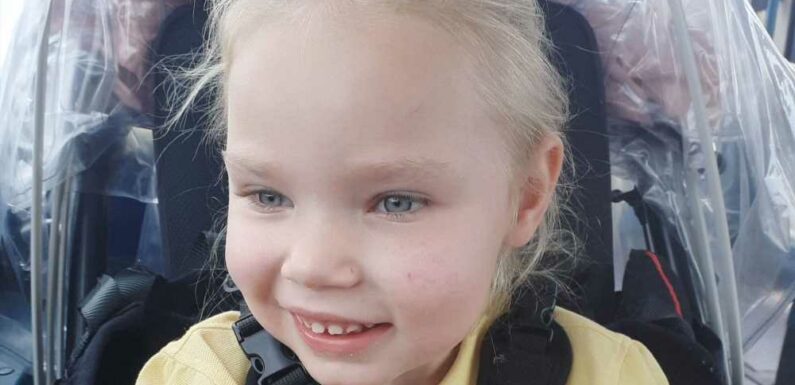
A MUM-OF-TWO's world was turned upside down when her daughter received a devastating diagnosis after she forgot how to crawl and talk overnight.
Up until the age of two, Ruby Pollard met the usual milestones for her age group, including saying common words and gesturing with her hands.
But almost overnight, the tot lost her ability to communicate, crawl, and support herself independently, and her mum Sandra Gamble thought she may have an Autism Spectrum Disorder.
After several years, she was diagnosed with a rare genetic disorder called Rett syndrome, Ms Gamble told the Manchester Evening News: “I’d never heard of the disorder, even when they asked for my consent to do a test, I knew nothing about it whatsoever.
"When we got a letter confirming the diagnosis, it invited me to have a chat with the genetics team and they told me it was a rare genetic disorder.
“She’s my baby and she’s locked in her body.
“It’s been really hard and upsetting. You think you’re reaching these milestones like crawling and it stopped."
Read More
Girl, 4, robbed of ability to walk overnight by cruel disease
Third of families with disabled children have gone into debt to access care
The rare condition affects approximately one in 12,000 girls and is only very occasionally diagnosed in boys.
It develops in four stages that appear at different times in each child.
Symptoms of the first stage, 'stagnation', are not usually recognisable until the child is around six months old.
Most read in Health
I'm a sexologist – this is the truth about your low libido & how to fix it
How to say NO & 7 other tips to put yourself first, according to a psychologist
The tell-tale signs of 5 cancers you need to know – from bloating to spotting
From blocked sinuses to hair loss – Dr Jeff answers your health questions
From then, factors such as low muscle tone, difficulty feeding, mobility problems with sitting, crawling and walking, as well as lack of interest in toys, can start to appear although they are often over-looked.
Ruby, aged five-years-old, can kneel up by herself but is unable to stand independently.
Stage two is termed 'regression' or sometimes known as the 'rapid destructive stage' and this is when more severe problems begin to show.
Communication, memory, mobility and co-ordination will be affected,some children will suffer the loss of the ability to move their hands purposefully, periods of distress, social withdrawal and problems sleeping among other symptoms.
"She was full regressed. It was deflating – you feel deflated. What else is Rett syndrome going to take from her?” Ms Gamble added.
The tot has also lost her ability to move her hands purposefully, instead she displays repetitive hand movements and grabbing things constantly.
When parents notice these changes, they often associate them with Autism, especially as they develop between the ages of one and four.
The next phase is called 'plateau' which can last for many years and affect a child at anywhere from two-years-old to 10-years-old.
Parents may see an improvement regarding emotional stability and behaviour, with a reduction of irritability and crying.
However, seizures and irregular breathing patterns could worsen, and weight management often becomes difficult.
“One of the hardest things is when she’s really upset and there’s full on tears; I know she’s in pain but I don’t know why," Ms Gamble continued.
“I don’t know what’s scarier – the seizures of the syndrome. She was diagnosed with epilepsy in March this year. She’s on medication now.
“The last one was on July 13. You’re always just waiting. She’s been full of cold recently and illness can be a trigger, so you’re always holding your breath," she added.
Finally, stage four, 'deterioration in movement,'can persist for over a decade and during this period, scoliosis, muscle weakness and spasticity, as well as the ability to walk are the primary symptoms.
Brain function, however, is not seen to decline, in fact repetitive hand movements and seizures decrease, and eye glaze commonly improves.
The devastated mum said: “Doctors can’t tell me whether she will walk or talk again.
"She’s only five; there’s hope she will build up her muscles. I know of children who started using a walker at the age of seven.
“They very much stick to the fact that no child with the syndrome follows the same path. There’s a lady in her 70s with it who is still alive.
“We had all these therapy sessions and scans and I was concentrating on what’s going on with Ruby and what the disorder could be. I let it take over rather than have quality time with my baby.”
The mum-of-two does describer her daughter as a happy child however and can use her voice enough to communicate emotionally.
A special trike has also been designed that helps children with physical disabilities move around in something other than a wheelchair, which Ruby is photographed enjoying.
She is also in mobility therapies such as physiotherapy and hydrotherapy which are hoped to improve Ruby's physical abilities.
To donate towards the trike for Ruby, click the link.
Read More on The Sun
I’m so skint I’ll buy my Xmas presents from Poundland…I go without electricity
Major change to childcare rules set to save money for parents
Source: Read Full Article










